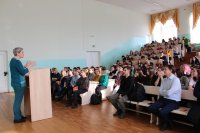FFL Students and Teachers Meet Kristin Tytgut, Translator and Interpreter of the European Parliament
 On October 21,the Faculty of Foreign Languages of I. Yakovlev Chuvash State Pedagogical University hosted a meeting with Kristin Tytgut, a practicing translator and interpreter of the European Parliament, a teacher at the Free University of Brussels, and a polyglot. The event was held in the framework of the XXIV International Festival of Languages and the NAUKA0 + Festival.
On October 21,the Faculty of Foreign Languages of I. Yakovlev Chuvash State Pedagogical University hosted a meeting with Kristin Tytgut, a practicing translator and interpreter of the European Parliament, a teacher at the Free University of Brussels, and a polyglot. The event was held in the framework of the XXIV International Festival of Languages and the NAUKA0 + Festival. Kristin began the meeting with students and professors with the theoretical aspects of translation, reminding the students of the existence of different types of interpretation - simultaneous, consecutive, paragraph-phrase, one-way and two-way. The students learned about the types of interpretation used in the European Parliament and what qualifications an international level translator should have. The listeners asked Kristin questions about her experience in learning foreign languages (her native language is Dutch, and she is fluent in Russian, English, French, German and even Esperanto). The students wanted to know about the main difficulties and pitfalls of the profession of an interpreter, simultaneous interpretation atVIPevents, issues of political correctness, prospects of the profession of a translator/interpreter in the context of the rapid computer translation development, and etc.
Kristin is not only an experienced translator and interpreter: she also teaches TranslationTheory and Practice at the university. That is why the second part of the meeting was held in the format of a workshop for the students and professors of the Translation Department. The students had a chance to try themselves in the role of interpreters and translatedenvironmental activist Greta Thunberg’s speech at the UN Climate Summit from English into Russian.
At the end of the event Kristin reminded the future translators and interpreters of the needto constantlyimprove their native and foreign language skills, and expand their “horizontal knowledge” (they say, an interpreter/translator should know everything). She wished everyone good luck with the chosen profession.
Photos by A. Ipatova